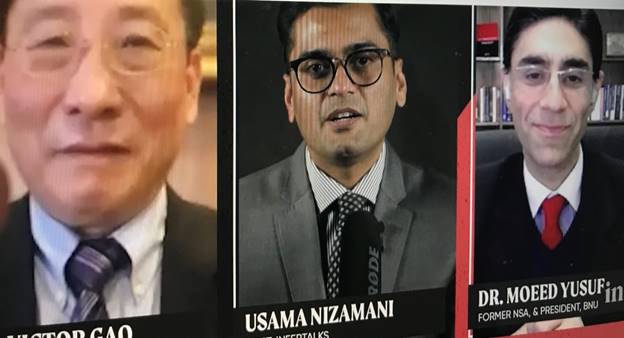

CPEC Comes under the Spotlight at InferTalks
By Elaine Pasquini
Washington, DC

The February 1, 2024, episode of InferTalks, a digital platform offering news and insights on global issues, featured Victor Gao, chair professor at Soochow University and vice president of the Beijing-based Center for China and Globalization; and Dr Moeed Yusuf, vice chancellor of Beaconhouse National University and Pakistani National Security Advisor in 2022. InferTalks host Usama Nizamani moderated the online discussion.
Gao began the program with a discussion of the summit between President Biden and President Xi in November last year in San Francisco. He described the much-anticipated meeting as an important political event in China-US bilateral relations both in terms of optics as well as in terms of substance.
“Now whether the United States took the right walk subsequent to the San Francisco meeting, that’s another matter,” he noted. “We really need to observe what the United States is doing very closely and make sure that they not only talk the right talk, but walk the right walk in dealing with major issues in China-US relations.”
As a firm believer of the inevitability of peace between China and the United States, Gao insisted that war is not and should not be an option between the two countries and whatever differences exist should be resolved peacefully.
Noting the size of the Chinese economy has already passed that of the United States in terms of purchasing power parity, Gao argued it would be futile for “some of the decisionmakers in Washington to try to impose sanctions against China in the belief that they can bring China down.”
The differences between China and the United States should not be a problem but should unite the two great powers. “The world will be a better and safer place if China and the United States can eventually resolve their differences in peace and that will be a good signal for the rest of the world because if China and the United States really go in separate ways and engage in war with each other it will be a catastrophe,” he said.
Regarding territorial disputes between India and China, Gao pointed out these disagreements were not created by either India or China, but by the “British Indian colonists and neither China nor India should be held hostage by this bad legacy left over by the British. And I do hope China and India will have enough courage and wisdom to resolve their territorial disputes in peace rather than resorting to war between China and India. Both have a population of more than 1.4 billion and it would be a true catastrophe for mankind as a whole. Further, if you look at the geography on the ground, I would say the biggest enemy of India is not China, the biggest enemy of India is the terrain. How can you really indulge the fantasy that Indian soldiers can fight a war against the mighty Himalaya?” he posited.
Between China and India there is a very important understanding that whatever clashes that might happen along the border between the two militaries they should not use “real weapons, for example firing real shots at each other,” he said. “They should avoid such hostilities to start with and if, unfortunately, hostilities do break out they should be restricted to physical hostilities, such as by fists.”
“Neither China nor India can afford to have a full-blown war along the border and the fact that China’s economy today is already about six times as big as the Indian economy also speaks eloquently for no war between China and India,” he added.
Discussing the China-Pakistan Economic Corridor (CPEC), Gao called the program “the signature and most important project of all the Belt and Road Initiative projects…and when you look at CPEC in terms of its size, its magnitude, its sustainability and its lasting impact on Pakistan, it will truly be a landmark deal for Pakistan in terms of growing its manufacturing capacity, growing its activities of all kinds and promoting activity between China and Pakistan.”
Dr Moeed Yusuf agreed with Gao that CPEC is integral to connectivity between China, Pakistan and the rest of the region and said that he is a “big proponent of bringing other countries into CPEC and making it a multinational initiative.”
According to Yusuf, one of the reasons that CPEC has been opposed by many in the West is that they feel this is a collaboration of China and Pakistan against the West. “That was never the idea,” he insisted. “It is actually infrastructure; it is roads; it’s energy; it is going to be special economic zones and both China and Pakistan have an interest in bringing any and every investment into it which will benefit connectivity.”
In addition, since Pakistan aims to be a geo-economic hub and build around connectivity in the region, “there is no reason not to allow other investors to come in,” Yusuf said. “CPEC’s extension into Afghanistan is something both China and Pakistan have talked about…because once you create that extension you create more connectivity into and out of Afghanistan which is necessary for countries if they want to benefit from Afghanistan’s economy, mines and minerals, etc.”
Yusuf recommended that CPEC should be marketed as a global initiative. “In fact, I would argue that both China and Pakistan have tried to do that and that’s really the signal that we’ve been sending,” he said.
Better communication about CPEC and its intentions and future plans is necessary, he said. Of special importance is the port at Gwadar and building special economic zones. “For China and Pakistan, it’s imperative to get these special economic zones off the ground as soon as possible, prioritize right and then market it to the world to take advantage of the opportunities created.”
(Elaine Pasquini is a freelance journalist. Her reports appear in the Washington Report on Middle East Affairs and Nuze.Ink.)

